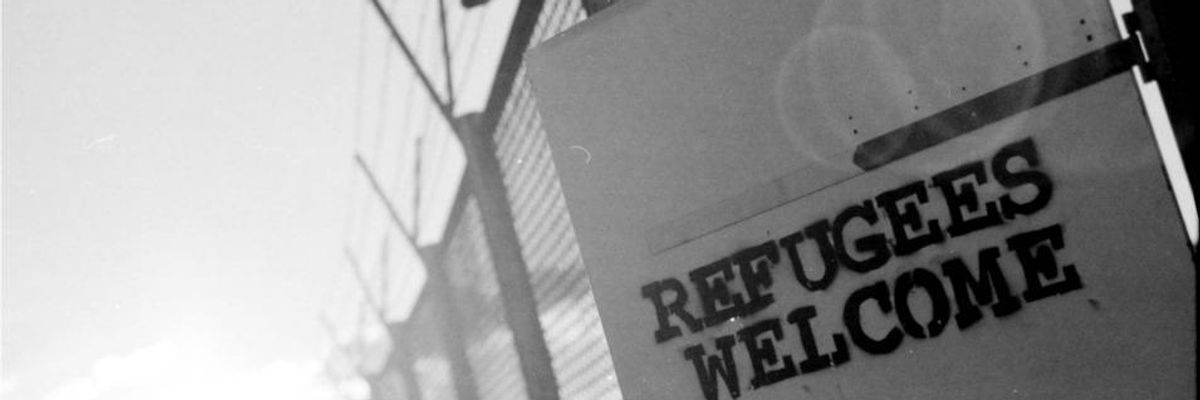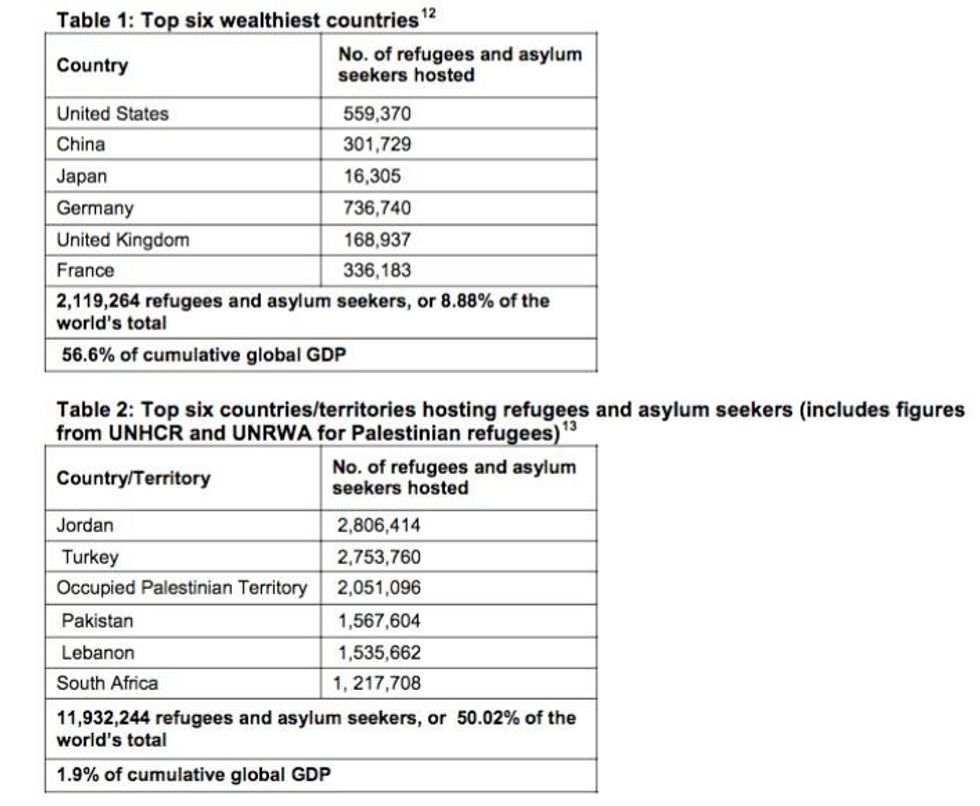
"We must stand as one with the millions of people who have been forced to flee as they need our help." (Photo: Tilman Koneke/flickr/cc)
To donate by check, phone, or other method, see our More Ways to Give page.

"We must stand as one with the millions of people who have been forced to flee as they need our help." (Photo: Tilman Koneke/flickr/cc)
The world's six wealthiest nations are "turning their backs" on refugees, hosting less than nine percent of those who have fled their homes due to war and violence and leaving poorer countries to shoulder the burden, a damning new report from Oxfam reveals.
According to the United Nations Refugee Agency, the number of displaced people around the world has surpassed 65 million--an "unprecedented" milestone "that represents unacceptable human suffering."
Yet the Oxfam briefing released Monday shows that the United States, China, France, Germany, Japan, and the United Kingdom--which together account for more than half of the global economy--have taken in just 8.88 percent of those 65 million.
Meanwhile, though they account for less than two percent of the cumulative world GDP, Jordan, Turkey, Pakistan, Lebanon, South Africa, and the Occupied Palestinian Territory host over 50 percent of the world's refugees, the report finds.

"It is shameful so many governments are turning their backs on the suffering of millions of vulnerable people who have fled their homes and are often risking their lives to reach safety," said Winnie Byanyima, executive director of Oxfam International. "Poorer countries are shouldering the duty of protecting refugees when it should be a shared responsibility, but many richer countries are doing next to nothing."
Citing its own research on one of the main regional drivers of the so-called refugee crisis, the Oxfam report notes that "some governments have not only given their 'fair share' of aid for those whose lives have been blighted by Syria's terrible conflict, but also welcomed their fair share of Syrian refugees to their countries."
The Oxfam report comes ahead of two major summits about refugees and migrants in New York in September. To that end, the organization has launched a petition demanding:
"Too many people who have taken treacherous journeys to reach safety end up living in degrading situations littered with abuse, hostility and discrimination, and too few governments are doing anywhere near enough to help or protect them," Byanyima said. "We must stand as one with the millions of people who have been forced to flee as they need our help."
Donald Trump’s attacks on democracy, justice, and a free press are escalating — putting everything we stand for at risk. We believe a better world is possible, but we can’t get there without your support. Common Dreams stands apart. We answer only to you — our readers, activists, and changemakers — not to billionaires or corporations. Our independence allows us to cover the vital stories that others won’t, spotlighting movements for peace, equality, and human rights. Right now, our work faces unprecedented challenges. Misinformation is spreading, journalists are under attack, and financial pressures are mounting. As a reader-supported, nonprofit newsroom, your support is crucial to keep this journalism alive. Whatever you can give — $10, $25, or $100 — helps us stay strong and responsive when the world needs us most. Together, we’ll continue to build the independent, courageous journalism our movement relies on. Thank you for being part of this community. |
The world's six wealthiest nations are "turning their backs" on refugees, hosting less than nine percent of those who have fled their homes due to war and violence and leaving poorer countries to shoulder the burden, a damning new report from Oxfam reveals.
According to the United Nations Refugee Agency, the number of displaced people around the world has surpassed 65 million--an "unprecedented" milestone "that represents unacceptable human suffering."
Yet the Oxfam briefing released Monday shows that the United States, China, France, Germany, Japan, and the United Kingdom--which together account for more than half of the global economy--have taken in just 8.88 percent of those 65 million.
Meanwhile, though they account for less than two percent of the cumulative world GDP, Jordan, Turkey, Pakistan, Lebanon, South Africa, and the Occupied Palestinian Territory host over 50 percent of the world's refugees, the report finds.

"It is shameful so many governments are turning their backs on the suffering of millions of vulnerable people who have fled their homes and are often risking their lives to reach safety," said Winnie Byanyima, executive director of Oxfam International. "Poorer countries are shouldering the duty of protecting refugees when it should be a shared responsibility, but many richer countries are doing next to nothing."
Citing its own research on one of the main regional drivers of the so-called refugee crisis, the Oxfam report notes that "some governments have not only given their 'fair share' of aid for those whose lives have been blighted by Syria's terrible conflict, but also welcomed their fair share of Syrian refugees to their countries."
The Oxfam report comes ahead of two major summits about refugees and migrants in New York in September. To that end, the organization has launched a petition demanding:
"Too many people who have taken treacherous journeys to reach safety end up living in degrading situations littered with abuse, hostility and discrimination, and too few governments are doing anywhere near enough to help or protect them," Byanyima said. "We must stand as one with the millions of people who have been forced to flee as they need our help."
The world's six wealthiest nations are "turning their backs" on refugees, hosting less than nine percent of those who have fled their homes due to war and violence and leaving poorer countries to shoulder the burden, a damning new report from Oxfam reveals.
According to the United Nations Refugee Agency, the number of displaced people around the world has surpassed 65 million--an "unprecedented" milestone "that represents unacceptable human suffering."
Yet the Oxfam briefing released Monday shows that the United States, China, France, Germany, Japan, and the United Kingdom--which together account for more than half of the global economy--have taken in just 8.88 percent of those 65 million.
Meanwhile, though they account for less than two percent of the cumulative world GDP, Jordan, Turkey, Pakistan, Lebanon, South Africa, and the Occupied Palestinian Territory host over 50 percent of the world's refugees, the report finds.

"It is shameful so many governments are turning their backs on the suffering of millions of vulnerable people who have fled their homes and are often risking their lives to reach safety," said Winnie Byanyima, executive director of Oxfam International. "Poorer countries are shouldering the duty of protecting refugees when it should be a shared responsibility, but many richer countries are doing next to nothing."
Citing its own research on one of the main regional drivers of the so-called refugee crisis, the Oxfam report notes that "some governments have not only given their 'fair share' of aid for those whose lives have been blighted by Syria's terrible conflict, but also welcomed their fair share of Syrian refugees to their countries."
The Oxfam report comes ahead of two major summits about refugees and migrants in New York in September. To that end, the organization has launched a petition demanding:
"Too many people who have taken treacherous journeys to reach safety end up living in degrading situations littered with abuse, hostility and discrimination, and too few governments are doing anywhere near enough to help or protect them," Byanyima said. "We must stand as one with the millions of people who have been forced to flee as they need our help."